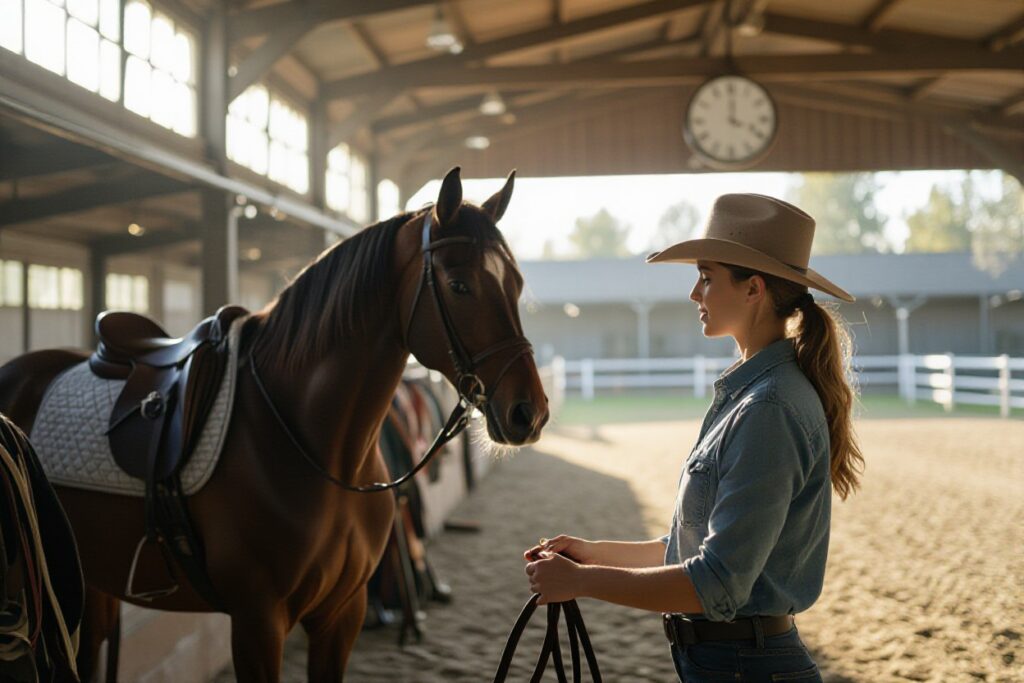This step-by-step guide will show you how to host a successful clinic at your barn. From planning and promotion to scheduling and execution, you can create an educational and fun event that will benefit both riders and horses. Let’s get started!


Planning and Preparation
Setting Clear Goals and Objectives for Your Clinic
Your first step in planning a clinic at your barn should be setting clear goals and objectives. What do you hope to achieve with this clinic? Are you looking to improve your riders’ skills, introduce a new discipline, or educate your community? When you have a clear understanding of what you want to accomplish, you can better plan the structure and content of your clinic to meet those goals.
Choosing the Right Clinician for Your Clinic
Assuming you have a specific goal in mind for your clinic, you’ll want to choose the right clinician to help you achieve it. Look for someone with experience and expertise in the area you are focusing on. Do they have a proven track record of success in teaching or training? Are they well-respected in the industry? These are all important factors to consider when selecting a clinician for your event.
For instance, if your goal is to improve your riders’ jumping skills, you will want to find a clinician who is knowledgeable and skilled in that particular discipline. They should be able to provide valuable insights and constructive feedback to help your riders reach their full potential.
Selecting a Date and Creating a Schedule
There’s no denying that selecting a date and creating a schedule for your clinic are crucial steps in the planning process. Consider factors such as the availability of your clinician, the time of year, and the schedules of your participants. You’ll want to choose a date that works for everyone involved and create a well-organized schedule that allows for ample time for instruction, practice, and any additional activities you have planned.
Clear communication with all parties involved is key to ensuring that the date and schedule are suitable for everyone. Make sure to provide detailed information well in advance so that participants can plan accordingly and make the most of their experience at your clinic.
Facilities and Equipment
Assessing Your Barn’s Capabilities and Limitations
One of the first steps in hosting a clinic at your barn is to assess your facilities’ capabilities and limitations. Make sure to consider the size and condition of your arena, the availability of parking for attendees, and the access to amenities like bathrooms and seating areas. It’s crucial to understand what your barn can comfortably accommodate to ensure a successful and smooth clinic.
Preparing Your Arena and Surrounding Areas
Assuming you have determined that your barn is suitable for hosting a clinic, the next step is to prepare your arena and surrounding areas. Lay out a plan for where spectators can watch, where participants can warm up their horses, and where any vendors or sponsors can set up their booths. Having a clear layout will help the clinic run efficiently and prevent any confusion or congestion.
Another important aspect of preparing your arena and surrounding areas is to ensure that the footing in the arena is suitable for the clinic activities. If necessary, make arrangements to have the arena footing groomed or watered to provide the best possible surface for both horses and riders.
Ensuring Adequate Equipment and Supplies
Any successful clinic relies on having the necessary equipment and supplies readily available. Make sure you have enough jump standards, poles, cones, and any other equipment needed for the clinic activities. Additionally, stock up on crucial supplies like first aid kits, water buckets, and cleaning tools to handle any unexpected situations that may arise during the clinic.
Limitations: It’s important to recognize that not having enough equipment or supplies can severely impact the quality of the clinic and create safety hazards. Ensure you have an ample supply of everything you need to host a successful and enjoyable clinic for both participants and attendees.

Marketing and Promotion
Creating an Effective Marketing Strategy
Keep in mind that effective promotion is key to hosting a successful clinic at your barn. Strategy is necessary in reaching out to potential attendees and getting the word out about your event. Start by identifying your target audience – consider the discipline, skill level, and interests of the riders who would benefit most from the clinic.
Utilizing Social Media and Online Platforms
There’s no denying the power of social media in today’s digital age. Platforms like Facebook, Instagram, and Twitter can be invaluable tools in promoting your clinic. Create engaging posts that highlight the unique selling points of your clinic, such as the expertise of the clinician or the specialized focus of the event. Utilize targeted advertising to reach a broader audience and consider partnering with influencers or equestrian groups to help spread the word.
Online registration and ticket sales can also streamline the process for participants, making it easier for them to secure a spot at your clinic. Provide clear instructions on how to sign up and include links to your registration page on all your online promotional materials.
Designing Promotional Materials and Advertising
Some eye-catching promotional materials can help grab the attention of potential attendees. Design flyers, posters, and banners that clearly communicate the details of your clinic, including the date, time, location, and any special features. To make your advertising more effective, consider using professional quality images and graphics that reflect the quality of the clinic you are hosting.
Logistical Considerations
Coordinating with the Clinician and Participants
For a clinic at your barn, communication with the clinician and participants is crucial. Make sure to discuss the date, time, and agenda well in advance to ensure everyone is on the same page. Provide the clinician with any specific requirements or equipment they may need, and encourage participants to ask any questions they may have beforehand.
Managing Registration and Payment Processes
There’s a lot to consider when it comes to managing registrations and payments for your clinic. Utilize online registration forms to streamline the process and keep track of participants. Clearly outline the payment process, including any deposit requirements or deadlines. Consider using platforms such as PayPal or Venmo for easy and secure transactions.
Understanding the importance of clear communication and transparency when it comes to registration and payment processes is key to a successful clinic. Make sure participants are aware of all costs upfront and have a clear understanding of what is included in their registration fee.
Planning for Food and Beverage Options
Registration for a clinic at your barn often involves long hours of training and learning. To keep everyone energized and focused, offering food and beverage options is imperative. Consider providing snacks and drinks throughout the day, as well as options for lunch. You can either arrange catering or ask participants to bring their own meals.
It is important to cater to any dietary restrictions or preferences that participants may have. Make sure to gather this information during the registration process and plan accordingly to ensure everyone is well taken care of during the clinic.
Tips for a Successful Clinic
Unlike your regular riding lessons, hosting a clinic at your barn requires careful planning and organization to ensure a successful event. Here are some key tips to help you make the most out of your clinic:
- Creating a Positive and Productive Learning Environment
- Managing Participant Expectations and Needs
- Building Relationships with the Clinician and Participants
Creating a Positive and Productive Learning Environment
With a clinic, you have the opportunity to bring in a new perspective and expertise to your barn. Make sure the facility is clean and organized, providing a safe and welcoming space for both the clinician and participants. Setting clear goals and expectations for the clinic beforehand will help ensure everyone is on the same page and working towards a common objective. Encourage open communication and create a positive atmosphere where everyone feels comfortable asking questions and seeking feedback.
Managing Participant Expectations and Needs
If you want the clinic to run smoothly, it’s vital to manage the expectations and needs of all participants. Provide detailed information about the clinic schedule, including any required attire or equipment. Address any special requirements or accommodations well in advance to avoid last-minute confusion. The more prepared and informed your participants are, the more they can focus on learning and getting the most out of the clinic.
The success of your clinic largely depends on how well you communicate with your participants and address their individual needs. By being attentive and responsive to their concerns, you can create a supportive and inclusive learning environment that benefits everyone involved.
Building Relationships with the Clinician and Participants
Successful clinics not only focus on the educational aspect but also on fostering relationships with the clinician and participants. Take the time to introduce everyone and facilitate interactions to create a sense of community. Encourage participants to engage with the clinician and each other, fostering a collaborative and supportive atmosphere. Show appreciation for everyone’s contributions and efforts, creating a positive experience that will leave a lasting impression.
Plus, building strong relationships with the clinician and participants can lead to potential future collaborations, networking opportunities, and continued growth and learning in the equestrian community.

Overcoming Common Challenges
Dealing with Inclement Weather and Last-Minute Cancellations
Now, one of the common challenges you may face when hosting a clinic at your barn is dealing with inclement weather and last-minute cancellations. There’s not much you can do to control the weather, but you can have a backup plan in place in case of rain or extreme conditions. Make sure to communicate with participants ahead of time about the possibility of rescheduling due to weather and have a rain date in mind.
Handling Conflicts and Difficult Situations
Assuming conflicts or difficult situations may arise during the clinic, it’s imperative to be prepared to handle them with professionalism and grace. With varying personalities and levels of experience among participants, disagreements or misunderstandings can happen. It’s crucial to address any conflicts promptly and openly, encouraging respectful communication and finding solutions that work for all parties involved.
Maintaining a Smooth and Efficient Operation
LastMinute, ensuring a smooth and efficient operation during the clinic is key to its success. Dealing with logistics, time management, and unexpected challenges efficiently will help you run a successful clinic. Having a detailed schedule, clear instructions for participants, and a dedicated team to assist you will contribute to a well-organized event.
Conclusion
With these considerations in mind, you can successfully host a clinic at your barn. Make sure to plan ahead, communicate effectively with the clinician, set a clear schedule, provide amenities for both horses and riders, and ensure a safe and welcoming environment. By taking these steps, you can create a positive and educational experience for all participants.
Hosting a clinic can be a great way to bring together riders and improve your own skills as well. By creating a supportive and educational atmosphere, you can help others learn and grow while also benefiting from the expertise of a skilled clinician. So don’t hesitate to take on the challenge of hosting a clinic at your barn – it can be a rewarding experience for both you and your community.
Q: What are the steps to host a clinic at my barn?
A: To host a clinic at your barn, start by deciding on the type of clinic you want to host, such as a riding clinic, training clinic, or veterinary clinic. Next, reach out to potential instructors or experts to lead the clinic. Then, set a date and time for the clinic, promote it to your barn community, and ensure you have the necessary facilities and equipment ready for the event. Finally, communicate with participants, handle registrations, and make sure everything runs smoothly on the day of the clinic.
Q: How can I find instructors for the clinic?
A: You can find instructors for your clinic by reaching out to local trainers, coaches, or experts in the field you want to focus on. Networking with other barn owners or attending equestrian events can also help you connect with potential instructors. Additionally, you can search online for instructors who specialize in the type of clinic you want to host.
Q: What facilities and equipment do I need to host a clinic at my barn?
A: The facilities and equipment you need will depend on the type of clinic you are hosting. Generally, you will need an adequate arena or space for the clinic activities, seating or viewing areas for spectators, and access to restrooms and parking. You may also need equipment such as jump standards, poles, cones, or other training tools depending on the focus of the clinic.
Q: How should I promote the clinic to attract participants?
A: To promote your clinic and attract participants, use a combination of online and offline marketing strategies. Create a flyer or poster to display at your barn and local equestrian stores, and share the event on social media platforms such as Facebook and Instagram. You can also send out email invitations to your barn community and ask participants to spread the word to their networks.
Q: What should I consider when planning the schedule for the clinic?
A: When planning the schedule for your clinic, consider factors such as the duration of the clinic, the number of participants, and the availability of the instructor. Make sure to allocate enough time for each session or activity, including breaks for participants and the instructor. Communicate the schedule clearly to participants in advance so they know what to expect on the day of the clinic.










